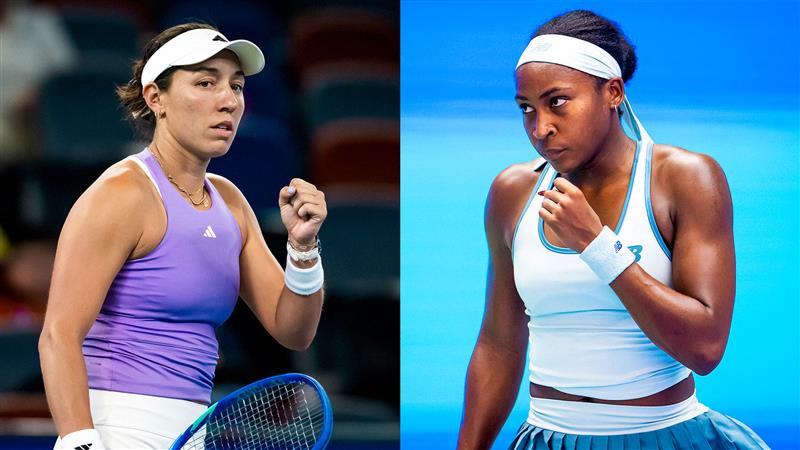Trailing World No. 1 Aryna Sabalenka 5-2 in the third set, Jessica Pegula rallied brilliantly to produce one of the most improbable comebacks of her career, 2-6, 6-4, 7-6 (2).
That ended Sabalenka’s 20-match win streak at the Dongfeng · Voyah Wuhan Open and sent Pegula hurtling into Sunday’s All-American final against Coco Gauff (6:30 p.m local., 6:30 a.m. ET).
Earlier, Gauff defeated Jasmine Paolini 6-4, 6-3. No woman has won more main-draw matches in China than Gauff (21) over the past three years. In four matches this season, she’s dropped only 16 games.
Pegula is a decade older and just came through her eighth straight three-set match but holds a 4-2 head-to-head advantage over her friend and former doubles partner. It’s the first time they’ve met in a final.
“Jess is so dangerous, especially on hard courts,” Gauff said. “It’s going to be a tough, interesting final.”
Said Pegula, “It’ll be awesome playing Coco in a final here. We know each other so well. There’s no secrets — we know what we’re going to try and do and what our gameplans are. It’s just going to be who can execute it the best.”
We assess their respective strengths:
Advantage, Gauff
Paolini had already beaten Gauff three times this year and was the only player left in the draw with a chance to improve her chances of qualifying for the PIF WTA Finals in Riyadh.
Gauff, meanwhile, had yet to meet a player ranked among the Top 50, but she made it look easy against the No. 8-ranked Paolini. She’s been a significant factor on the Hologic WTA Tour for five seasons now, but it’s easy to forget she’s still only 21.
This little gem from Stats Perform nicely frames her precocity:
Gauff defeats Paolini for the first time in 2025 to punch her ticket to the Wuhan final
The win over Paolini was Gauff’s 13th against a Top 10 player in WTA 1000 events, the most of any woman before her 22nd birthday in the format’s 16-year history.
While much of the attention has surrounded her work with new coach Gavin MacMillan and improving her serve, Gauff’s calling card has always been the return game, a lethal combination of anticipation, quickness and technique. It’s a leading reason Gauff has the head-to-head advantage over Sabalenka.
In four matches here, Gauff has posted some extraordinary numbers. She’s won 111 of 190 return points — a percentage of .584. She’s also converted 22 of 34 break points (.647).
Gauff has won eight of nine matches over the past three weeks, and she says it’s because China offers a welcome “mental reset” after a long summer.
“I think the US swing is very stressful for all the American players,” Gauff said. “I think just coming here on the other side of the world where there’s maybe less attention on us makes me feel a little bit freer playing here.
“That’s just how tennis works. I was talking to somebody in the locker room, and we were kind of saying it always happens when you don’t expect it to.”
Gauff will expect to win this one, though. She’s younger, fresher — and won handily the last time they played, at the year-end championships.
Advantage, Pegula
While the scoreline against Sabalenka was impressive it failed to fully capture the magnitude of her victory.
Pegula is closing in on 400 matches at the WTA level, but she had never, ever dropped the first set and come back to beat a Top 10 player. The record was 0-29 and 27 of those matches ended in straight sets.
Not only did Pegula win four straight games, but she overcame the flood of nerves that come with those breakthrough moments. Serving at 6-5 for the match, Pegula hit her first four double faults of the match and squandered two match points. And yet, she was able to wipe her memory clean and win the tiebreak decisively.
“I can’t believe I came back and won that,” Pegula said in her on-court interview. “I was clearly very nervous trying to serve it out — lost my timing, lost my rhythm, trying to go for too much — but I bounced right back in the tiebreak. I stay super-present, play the next point, move on and try to think about my strategy and what I need to focus on.
“I’m just really proud of myself. I mean, I’ve played so much tennis last few weeks, so many three-set matches … I feel like I’m very tough right now and I’m just using that as best I can.”
Pegula is keenly adept at recognizing opponents’ typical patterns and there were times against Sabalenka where she was moving even before the shot was struck. Similarly, Pegula was reading Sabalenka’s serve with uncanny accuracy, breaking her seven times.
This will be critical against Gauff, whose game she knows even better.
The win against Sabalenka was Pegula’s 50th of the year, making her — at 31 — the oldest woman to do that in a calendar year since Serena Williams 10 years ago.
Yes, she has to be depleted after those eight straight maximum-distance matches, but … she’s already qualified for Riyadh and will have nearly three weeks to rest and recuperate.
Expect her to come out and play Sunday like she did against Sabalenka.

